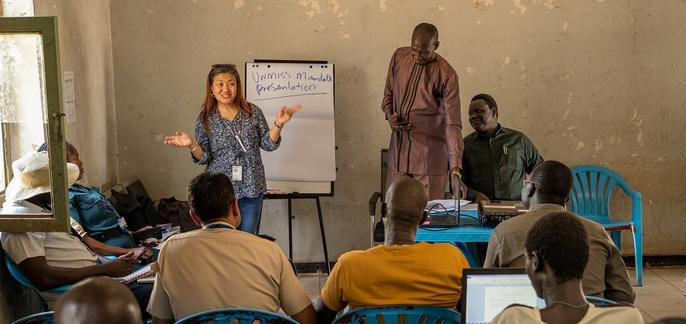In South Sudan, the world’s newest nation, violence against women and girls is often used as a weapon of war, writes UNMISS’ Peter Bateman.
As the country begins its democratic transition by beginning to draft its permanent constitution and preparing for upcoming elections in 2024, much remains to be done to prevent sexual- and gender-based violence.
The United Nations Mission in South Sudan (UNMISS) has, therefore, teamed up with humanitarian partners and government bodies In Unity State to form what is known as the Gender-Based Violence (GBV) sub-cluster.
This committed alliance aims to raise awareness among communities about the pressing need to end any form of violence against women.
To this end, a standard operating policy was created to enhance responses to women who have been victims of violence across all seven counties in the state.
However, as conflict dynamics change and become more complex, policy papers must also evolve to reflect on ground realities.
On 8 and 9 May, therefore, UNMISS, the state Ministry of Gender, Child and Social Welfare and the UN Population Fund (UNFPA) held a workshop dedicated to updating existing frameworks on preventing and responding to any form of violence perpetrated against women and girls.
As participants deliberated on ways to ensure a safer South Sudan for women, they forgot the unseasonable heat and the conflict-scarred tukul (mud hut) where they were seated. It was clear that the issue at hand mattered to everybody.
According to Bakhita Steven of the Non Violent Peace Force, an international nongovernmental organization dedicated to civilian protection, gender-based violence necessitates a whole-of-society approach, where transformations happen by changing hearts, minds and existing cultures that negatively impact women and girls.
“We have very good laws in South Sudan that are supposed to protect women rights, the problem is their enforcement,” she revealed.
“The community also has a vital role to play, especially in issues such as forced or early marriages and dowry, the latter being a key driver of domestic violence. It is time the women of South Sudan are seen as valuable, economically productive members of society rather than a source of income for families,” she stated passionately.
Initially drafted in 2018, the policy discussed at this platform has undergone regular updates to remain robust and adaptive to the ever-changing landscape of gender-based violence.
It serves as a detailed guide, outlining the roles and responsibilities of each stakeholder and reinforcing a comprehensive framework for eliminating all forms of violence against women.
This is especially critical given that the ongoing peace process in South Sudan is at a delicate juncture where women’s full and equal participation is essential in ensuring that peace gains are sustainable




